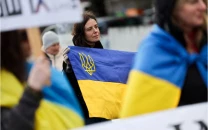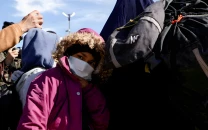US 'outraged' over how the Taliban office opened: Af-Pak envoy
US Af-Pak envoy James Dobbins says use of the Islamic Emirate title symbols, signs, nomenclature were incompatible.

"We contacted the government of Qatar, we protested and we asked them to take corrective measures and they took them," Dobbins told reporters in Kabul.
President Hamid Karzai reacted furiously to the office being styled as a Taliban government-in-exile under the rebels' white flag and using the name of the "Islamic Emirate Of Afghanistan" from their hardline 1996-2001 regime.
The flag and the name were the focus of a diplomatic bust-up that derailed an early stage of efforts to start peace talks as the US-led North Atlantic Treaty Organisation (NATO) combat mission winds down 12 years after the Taliban were ousted.
"We contacted the government of Qatar, we protested and we asked them to take corrective measures and they took them," Dobbins told reporters in Kabul.
"We were outraged ourselves because it was inconsistent with the assurances we had been given and the assurances we had given... We thought the Afghan reaction was both entirely predictable and entirely justified.
"The use of the Islamic Emirate title... (and) the symbols, signs and nomenclature were incompatible with what had been understood to be the arrangement."
Dobbins, the US special representative to Afghanistan and Pakistan, spoke to reporters in the Afghan capital after meeting with Karzai in talks that he described as "positive and upbeat".
The Afghan government, which has said it is still committed to the peace process, insists the Taliban's office in the Gulf state must only be used for direct negotiations with Karzai's appointed negotiators.
The contentious sign, flag and flagpole unveiled at the opening of the office last Tuesday have now been removed.
"President Karzai once again emphasised that Afghanistan wants a peace process that by all means be led and owned by Afghans," his office said after the meeting with Dobbins.
Karzai, angered at how the Taliban had been allowed to pull off such a publicity coup, broke off Afghan-US talks on an agreement that could allow the US to maintain soldiers in Afghanistan after the Nato combat mission ends.
Dobbins said he had not discussed the Bilateral Security Agreement or when negotiations might re-start.
The Qatar dispute was "a combination of misunderstandings and a desire on the Taliban's part to score a propaganda advance and that they seem to have over-played their hand", Dobbins said.
Afghanistan has so far declined to send representatives to Qatar, but pressure is growing for a ceasefire and eventually a peace settlement ahead of next year's Nato withdrawal and Afghan presidential elections due to April.
"After these meetings (with Dobbins), our information will be complete and we can then decide whether to send our delegation to Qatar," Ismael Qasimyar, a senior member of the Afghan peace negotiators, told AFP.
About 100,000 foreign combat troops, 68,000 of them American, are due to exit Afghanistan by the end of 2014, and NATO formally transferred responsibility for nationwide security to Afghan forces last week.
When in power, the Taliban imposed a harsh version of Sunni Islamic law that banned television, music and cinema, stopped girls from going to school and forced women to wear the all-covering burqa.
They were ousted in 2001 for sheltering al Qaeda after the 9/11 attacks, but launched a resilient and bloody insurgency against US-led Nato troops and the US-backed Afghan government.
Troubled relations between Karzai and his US backers have degenerated into public rows in the past, but many Afghans reacted with scepticism to news that the Taliban could be ready to enter peace talks.
President Barack Obama has insisted the Taliban have to renounce ties to al Qaeda, halt violence and commit to the protection of women and minorities.
When opening their mission in Qatar, the Taliban did not explicitly renounce al Qaeda, which they refused to expel after the 9/11 attacks, but did vow to prevent attacks being launched from Afghanistan.



















COMMENTS
Comments are moderated and generally will be posted if they are on-topic and not abusive.
For more information, please see our Comments FAQ